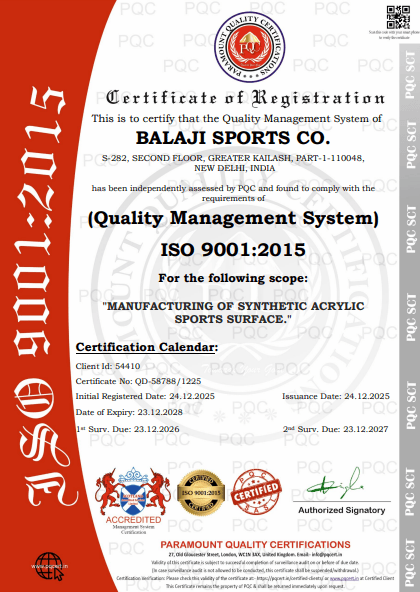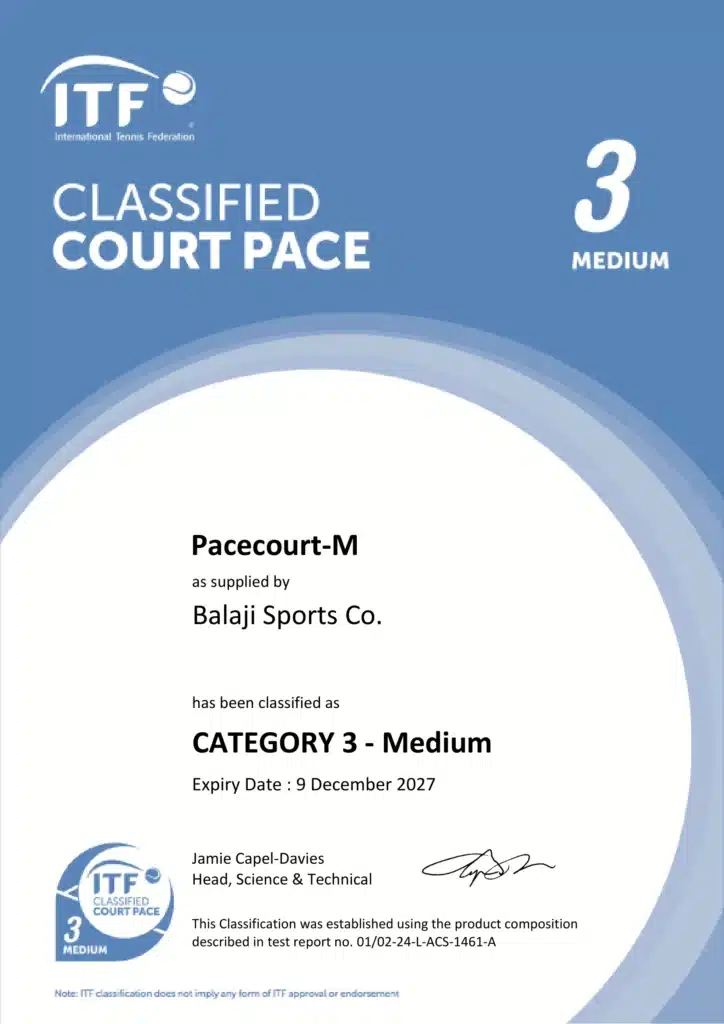Pacecourt offers synthetic acrylic flooring system designed for long-lasting performance, consistent ball bounce, and player safety. It includes multiple layers applied over a concrete or asphalt base to create a professional-grade sports surface.
Pacecourt’s standard synthetic sports flooring includes the following layers:
Base Surface – Asphalt or Concrete
Acrylic Primer Coat – For adhesion to base
Cushion Coat – Rubberized coating for shock absorption
Acrylic Resurfacer – Fills pores and levels the surface
Color Coats – UV-stable, textured acrylic coatings
Line Marking Paint – Final layer for court markings
Pacecourt flooring is ideal for – Tennis, Basketball, Volleyball, Badminton, Pickleball, Skating rink, Multi-purpose, and multi-courts.
Pacecourt uses 100% acrylic, non-toxic, weather-resistant compounds. The materials are designed to resist fading, cracking, and delamination even under extreme weather conditions.
The cushion coat provides added shock absorption, reducing stress on joints and improving player comfort. It is beneficial for high-impact sports like basketball and tennis.
With proper maintenance, Pacecourt surfaces last 4 to 7 years. After that, only recoating or resurfacing is needed, not complete replacement.
The 5-layer system includes a concrete primer, acrylic resurfacer (1-layer), cushion coat (2-layer), color coat (2-layer), and line marking, making it ideal for standard play areas.
The 8-layer system, built on an asphalt base, includes 1 layer of acrylic resurfacer, 5 cushion coats, 2 color coats, and line marking, offering enhanced shock absorption, comfort, and durability for professional courts.
The 8-layer system is perfect for high-performance as it includes 5 cushion layers that significantly reduce joint stress and improve player experience. The 5-layer system is more suitable for schools, clubs, or recreational use where a basic but durable surface is sufficient.
Synthetic acrylic materials offer a perfect combination of durability, weather resistance, UV stability, slip control, and vibrant color. They provide consistent bounce, reduce surface glare, and require low maintenance, making them ideal for all-weather performance on outdoor sports courts.
Synthetic Acrylic surfaces are best flooring for outdoor tennis courts, with longer durability, UV resistance and consistent ball bounce.
With proper maintenance synthetic acrylic tennis court flooring can last 5-7 years.
Cushion coatings reduce impact on joints and are ideal for frequent or professional level play.
Yes, multi-sport acrylic flooring can support tennis, pickleball and badminton.
Tennis court should resurface every 4-6 years depending on usage and weather exposure.
Both are viable but concrete tennis court is better and requires lower maintenance.
Yes, residential tennis courts are gaining popularity with compact size variants available.
Regular cleaning, crack filling and occasional topcoat maintenance is a must for tennis court.
Standard tennis court dimensions are 78 feet (23.77 meters) long and 27-36 feet (8.23-10.97 meters) wide.
The standard basketball court dimensions are 28 meters by 15 meters (92 ft × 49 ft).
Acrylic synthetic flooring is the best flooring for outdoor basketball courts.
Hardwood or synthetic polyurethane is used in professional indoor basketball courts.
Yes, acrylic materials are best for basketball court flooring.
5 -8 layers with cushion coat is ideal thickness for basketball court.
Clean, inspect and recoat every few years to maintain volleyball court surface.
A basketball court surface with anti-skid texture, proper cushioning, and shock absorption ensures player safety during high-impact games.
Yes, you can install interlocking tiles for basketball courts for portable or DIY setups, especially for temporary or school-use courts.
With proper maintenance, synthetic basketball flooring can last between 5 to 8 years, even under heavy foot traffic.
Synthetic acrylic flooring is best for both outdoor pickleball court flooring.
Pickleball court dimension is 20 feet by 44 feet (6.1 m × 13.4 m).
Yes, you can convert a tennis court into a pickleball court with lines and sometimes temporary or permanent nets.
Yes, synthetic acrylic pickleball flooring is better than concrete, and provide better grip, bounce and joint comfort.
Cushion coatings are optional but recommended for joint protection especially for older players.
Yes, you can play pickleball on a badminton or tennis court with portable nets and lines, multi-use courts are possible.
Synthetic acrylic flooring is UV and weatherproof, ideal for outdoor pickleball court.
Pickleball court surfacing can last in 5-7 years with moderate use and maintenance.
Cleaning, debris removal and occasional re-coating required for pickleball courts.
Acrylic synthetic flooring is the best flooring for outdoor volleyball courts.
Wooden and synthetic polyurethane is the best indoor volleyball court surface.
Yes, outdoor volleyball courts have synthetic acrylic flooring. And this the best flooring for outdoor court.
Regular cleaning, surface inspections, repainting are important to maintain volleyball court surfaces.
Indoor volleyball floors need more shock absorption, while outdoor volleyball floors need more durability and grip.
Yes, multi-purpose courts with acrylic flooring can be used for volleyball, basketball, futsal.
Synthetic volleyball court flooring can last 6–8 years.
Yes, anti-skid coatings enhance player safety by preventing slips during fast-paced movements.
A leveled concrete base is ideal for synthetic acrylic or PU flooring, ensuring proper drainage and surface stability.
PVC Vinyl and PU flooring is the top choice for indoor badminton court due to cushioning, grip and consistent shuttle response.
Synthetic acrylic flooring is best for outdoor badminton courts.
Official badminton court size is 44 ft x 20 ft (13.4m x 6.1m) but extra space is ideal for movement.
Yes, it reduces impact on knees making the game safer for frequent players.
Badminton flooring can last 5-7 years or more with proper care and low to moderate traffic.
Keep the badminton court clean, dry and check periodically for wear. Don’t drag chairs or heavy equipment.
Not at all. It is still used professionally but synthetic options are cheaper and low maintenance.
No, a flat and level base is necessary for proper badminton court installation and safety.
Yes, as long as the surface meets BWF (Badminton World Federation) specifications.
Synthetic acrylic flooring is ideal for multi-purpose courts due to its durability, slip resistance, weather-proof nature, and suitability.
Yes. Acrylic surfaces offer consistent bounce, grip, and shock absorption across sports, making them perfect for environments like schools, clubs, and community centers.
Not if designed well. Multi-sport courts use color-coded lines to differentiate between games, ensuring clarity for players and referees.
With proper installation and basic maintenance, acrylic flooring can last 5–6 years, even with regular multi-sport use.
Yes! the cushioned nature of multi-purpose acrylic flooring helps reduce injuries and fatigue, making it safe for players of all ages and skill levels.
It depends on the size and complexity, installation typically takes 7–15 days, including base preparation, cushioning, surfacing, and line marking.
Yes, multi-purpose courts can be customized with brand logos, school emblems, and various vibrant color options to suit your aesthetic or identity.
No, routine cleaning and occasional recoating are all that’s needed to keep the surface safe, vibrant, and game-ready for years.
Synthetic acrylic coatings are UV-resistant and weatherproof, making them ideal for outdoor courts exposed to sunlight and rain.



